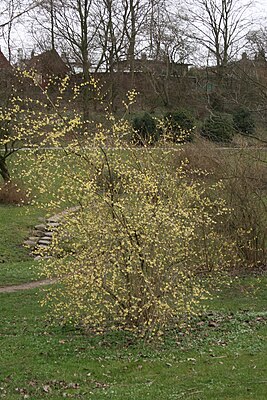Forsythia giraldiana
| Forsythia giraldiana | ||||||||||||
|---|---|---|---|---|---|---|---|---|---|---|---|---|

Habitus |
||||||||||||
| Systematics | ||||||||||||
|
||||||||||||
| Scientific name | ||||||||||||
| Forsythia giraldiana | ||||||||||||
| Lingelsh. |
Forsythia giraldiana , as Giralds forsythia called, is a yellow flowering shrub from the family of Olive Family (Oleaceae). The natural range of the species is in northwest China. It is rarely used as an ornamental shrub .
description
Forsythia giraldiana grows as a tightly upright shrub and reaches heights of up to 4 meters. The branches are bare and light brown. The pith of the branches is chambered. The leaves are divided into a petiole and a leaf blade. The petiole is 5 to 10 millimeters long, glabrous or finely hairy. The simple leaf blade is 3.5 to 12 inches long, 1.5 to 6 inches wide, elongated, elliptical, ovate to lanceolate, long, pointed with a rounded to wedge-shaped base and usually with entire margins to slightly toothed.
The stalked flowers stand individually, in twos or threes in the leaf axils. The calyx is 3 to 4 millimeters long, reddish and ciliate. The corolla is light yellow with a 4 to 6 millimeter long corolla tube and 0.7 to 1.5 centimeter long corolla lobes. The pistil is 3 millimeters long in flowers with 5 to 6 millimeter long stamens , 5 to 7 millimeters long in flowers with 3 to 5 millimeter long stamens. The capsule fruit is 0.8 to 1.8 inches long and 4 to 10 millimeters wide, egg-shaped or lanceolate-egg-shaped and has a few cork pores . Forsythia giraldiana flowers from March to May and fruit from June to October.
The number of chromosomes is 2n = 28.
Occurrence
The natural range is in the Chinese provinces of Gansu , Henan , Shaanxi and Sichuan . It grows in steppes and dry forests at heights of 800 to 3200 meters on moderately dry to fresh, slightly acidic to alkaline, sandy-loamy to loamy, nutrient-rich soils in sunny to light-shaded locations. The species loves warmth and is usually frost hardy.
Systematics
Forsythia giraldiana is a kind from the genus of forsythia ( Forsythia ) in the family of Oleaceae (Oleaceae). There it is assigned to the Forsythieae tribe . Alexander von Lingelsheim first described the species in 1908 .
use
Forsythia giraldiana is sometimes used as an ornamental shrub because of its decorative flowers .
proof
literature
- Wu Zheng-yi, Peter H. Raven (Ed.): Flora of China . Volume 15: Myrsinaceae through Loganiaceae . Science Press / Missouri Botanical Garden Press, Beijing / St. Louis 1996, ISBN 0-915279-37-1 , pp. 280 (English).
- Andreas Roloff , Andreas Bärtels: Flora of the woods. Purpose, properties and use. With a winter key from Bernd Schulz. 3rd, corrected edition. Eugen Ulmer, Stuttgart (Hohenheim) 2008, ISBN 978-3-8001-5614-6 , p. 300.
- Jost Fitschen: Woody flora . 12th, revised and expanded edition. Quelle & Meyer, Wiebelsheim 2007, ISBN 3-494-01422-1 , p. 496 .
Individual evidence
- ↑ German name after Roloff et al .: Flora der Gehölze , p. 300
- ↑ a b c Roloff et al .: Flora of the Woods , p. 300
- ↑ a b Mei-chen Chang, Lien-ching Chiu, Zhi Wei, Peter S. Green: Forsythia giraldiana . In: Wu Zheng-yi, Peter H. Raven (Ed.): Flora of China . Volume 15: Myrsinaceae through Loganiaceae . Science Press / Missouri Botanical Garden Press, Beijing / St. Louis 1996, ISBN 0-915279-37-1 , pp. 280 (English).
- ↑ a b Forsythia giraldiana. In: Germplasm Resources Information Network (GRIN). United States Department of Agriculture, accessed March 24, 2012 .
Web links
- Forsythia giraldiana. In: The Plant List. Retrieved March 24, 2012 .
